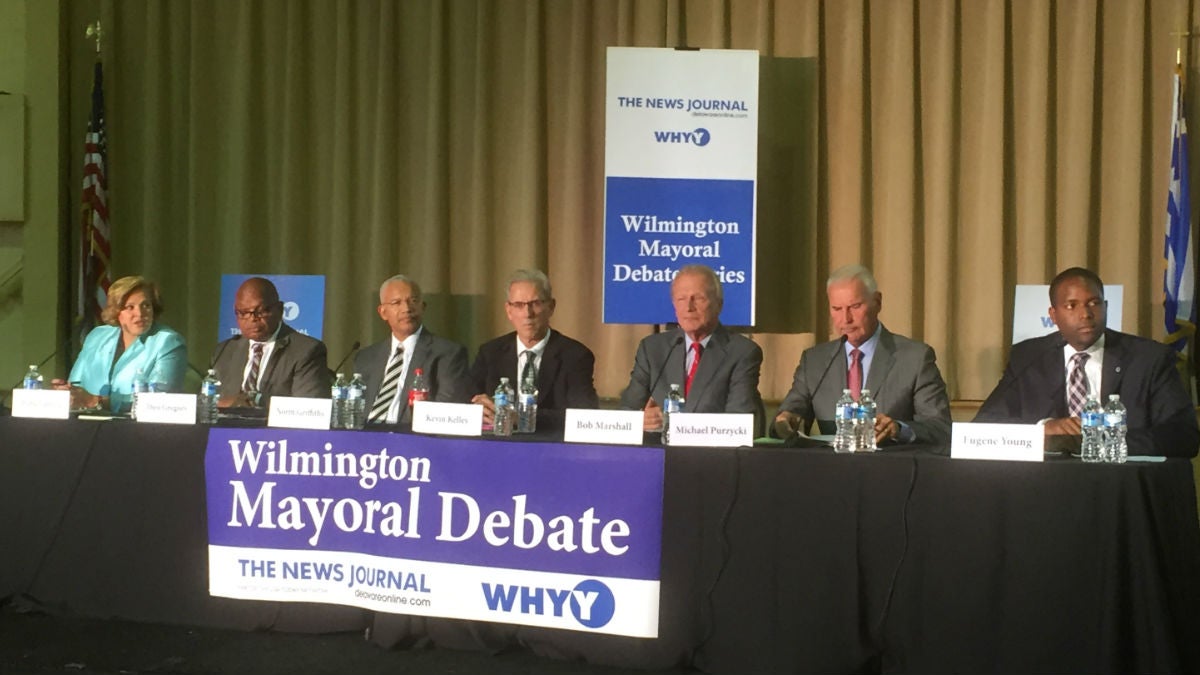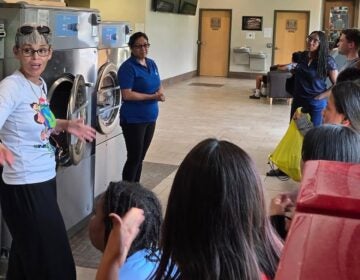Wilmington mayoral candidates attack each other in heated debate

A packed crowd watched seven of eight Democrats running for mayor debate the issues at Wilmington's Holy Trinity Greek Orthodox Church Tuesday night. (Zoë Read/WHYY)
Candidates for mayor of Wilmington attacked each other during a heated debate Tuesday night.
The debate held at the Holy Trinity Greek Orthodox Church in Wilmington was the fourth and final debate hosted by WHYY and the News Journal before the primary elections Sept. 13.
Seven of the eight candidates—all Democrats—briefly discussed the need to decrease crime and create job opportunities for city residents.
However, much of the debate was impassioned as the candidates questioned each other’s integrity and track records.
“If you want Wilmington to stay the same then vote for these guys here,” said Wilmington City Councilwoman Maria Cabrera. “I’m the one who stands for change, and I believe it is time to move the city forward.”
Some of the candidates accused incumbent Mayor Dennis Williams, D-Wilmington, who refused to attend the debate, of being an absent leader.
“This city is in such disarray,” said former Wilmington City Councilman Kevin Kelley. “He’s MIA…. He doesn’t show up for meetings.”
Kelley also attacked opponent Mike Purzycki, who has been accused of pushing Republicans to register as Democrat to vote for him in the primary election.
In April, a Republican businessman publicly urged other Republicans to become Democrats to vote for the Wilmington Riverfront Development Corporation executive director in the primary elections.
“He’s the de facto Republican candidate for mayor,” Kelley said.
Kelley wasn’t the only candidate to attack Purzycki—non-profit leader Eugene Young said he isn’t acquainted with the low-income residents of the city.
“I think Mike is a great guy, but I haven’t seen Mike working with people outside of the Riverfront,” Young said.
Purzycki responded by mentioning his work for the Hope Commission, an organization that helps ex-offenders reintegrate into society after release from prison.
“I get them apartments, I put them in my apartments because no one else would have them there,” he said.
Young also accused candidates with previous leadership of only campaigning in areas where the residents look like them, citing the 2012 elections.
“White candidates are just campaigning in white areas, black candidates are campaigning in black areas,” he said. “What you do now reflects how you will govern.”
Kelley, who ran for election in 2012, responded to Young; “Let’s not talk about what others have done unless you were there,” he said.
State Sen. Robert Marshall, D-Wilmington, said as a state leader he has achieved more to improve Wilmington than City Council, which four candidates currently or used to sit on. He cited continued violence in the city, and also accused city leaders of not doing their part to secure funding for police overtime in high crime areas.
“What have my opponents done to move this city forward?” he asked.
City Council President Theo Gregory argued his council has fought for public safety, partly blaming the mayor for struggles along the way.
“We are very big proponents for community policing,” he said. “We have done everything we can to get this mayor to do legitimate community policing.”
The candidates were able to express their plans for improving quality of life during some of their time, however.
The majority of the candidates said they have plans to create more workforce development training in the city, and they all said they are proponents of community policing.
Young said he would fight for a more tech-savvy city, where residents could quickly report issues in their neighborhoods through technology like phone apps. He also said he would strengthen city community centers.
“Community centers are our homeland security of our neighborhoods,” Young said.
Griffiths said the city is divided, and he would bring all communities together to work as a unit. He said community associations from across the city would meet to discuss city issues they can tackle together.
“I think we have to come together as a community,” Griffiths said. “So far if you look around Wilmington we’re still separated by race, we’re still separated by neighborhoods, and there’s no talking in between.”
Cabrera also said she would fight for neighborhood revitalization, and help renters become home owners.
“We can’t give up on our city, we have to look at most distressed neighborhoods and invest in them,” Cabrera.
WHYY is your source for fact-based, in-depth journalism and information. As a nonprofit organization, we rely on financial support from readers like you. Please give today.





